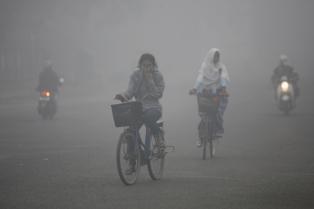
Credit: Coalition to save Tripa Forest / Handout / 3/05/2012
by Rabb!t / Earth First! Newswire
The Indonesian rainforest is in an unbalanced tug-o-war between corporations and the wild, and the government’s problem – solution/problem – solution/problem dance of reactionary politics is spiraling out of control.
In Indonesia, you have one of the most biologically diverse forests on the planet (ranking third in the world for number of species) being sold to giant conglomerates. Generally, these conglomerates decide to do one of two things with the rainforest: shred it into pulp and paper; or burn it down, in football field-size chunks, and replant the ashen land with palm trees.
Why palm trees? Though I’m sure the smoldering burial grounds of the once-tropical forest will be as good a tourist destination as any once the sea levels and super-storms catch up with atmospheric CO2 levels, these imported palm trees are not being planted for ambiance, but rather being squeezed for their palm oil.
If you haven’t heard of palm oil: go to the grocery store, pick a processed snack off the shelf, check the label. There’s a good chance it’s a key ingredient. It’s not healthy, but it’s lucrative. Palm oil produces more oil per acre than any major oilseed crop, and Indonesia is the world’s largest supplier.
So, these conglomerates solved their problem of how to compete in a global market by setting a rainforest on fire, selling it off, and replanting it with soil-sucking palm trees for Nabisco snacks and animal-tested cosmetics (oh, and don’t forget the animals inside the forests when they set the fires—there are more than 20 species of endangered mammals alone in the Indonesian rainforest, including orangutans, pygmy elephants, tree kangaroos, and Sumatran tigers), but this solution has brought on another problem. I’m not talking about climate change, deforestation, or genocide—I mean something that corporations and governments consider a problem. Basically, forest fires aren’t the easiest things to manage.

Residents of Sampit, Indonesia, bike through smog in Sept. 2012. (Photo: Reuters)
For instance, in Indonesia’s Riau province there were recently 555 reported fires, with 1,600 acres ablaze in the Benkalis district alone. The smoke and smog is so pervasive that in neighboring Singapore smog levels have reached a 16-year high. The problem is that the palm oil plantations, where most of the fires originate, are peat lands. Peat has a high carbon content and can burn under low moisture conditions, and it smolders once ignited. These smoldering fires can burn undetected for long periods of time, sometimes creeping underground for years. Some estimate that the peat bogs in Indonesia contain more than 50 billion tons of carbon, carbon that gets released during peat fires.
Okay, so that’s a lot of problems.
The solution? Stop burning down the world’s last remaining forests? Leave the animals and indigenous tribes, who have built a relationship with the land and with one another for centuries, alone? No, the Indonesian government (corrupt as most other governments) is much more creative than that. As The Raw Story reported today, Indonesia plans to use rain-making technology to put out the fires.
This weather-changing technique is called “cloud-seeding.” It involves helicopters injecting (I’m assuming this is a fancy word for “spraying”) chemicals into clouds above the fires. The chemicals force the clouds to form ice crystals, which then speeds up the production of rain.
Problem: Want more money. Solution: Burn down the forests and sell them off. Problem: Fire everywhere—Seems that when you mess with nature it gets out of control. Solution: Inject chemicals into the clouds to change the weather.
Well, that should be the end of that.

